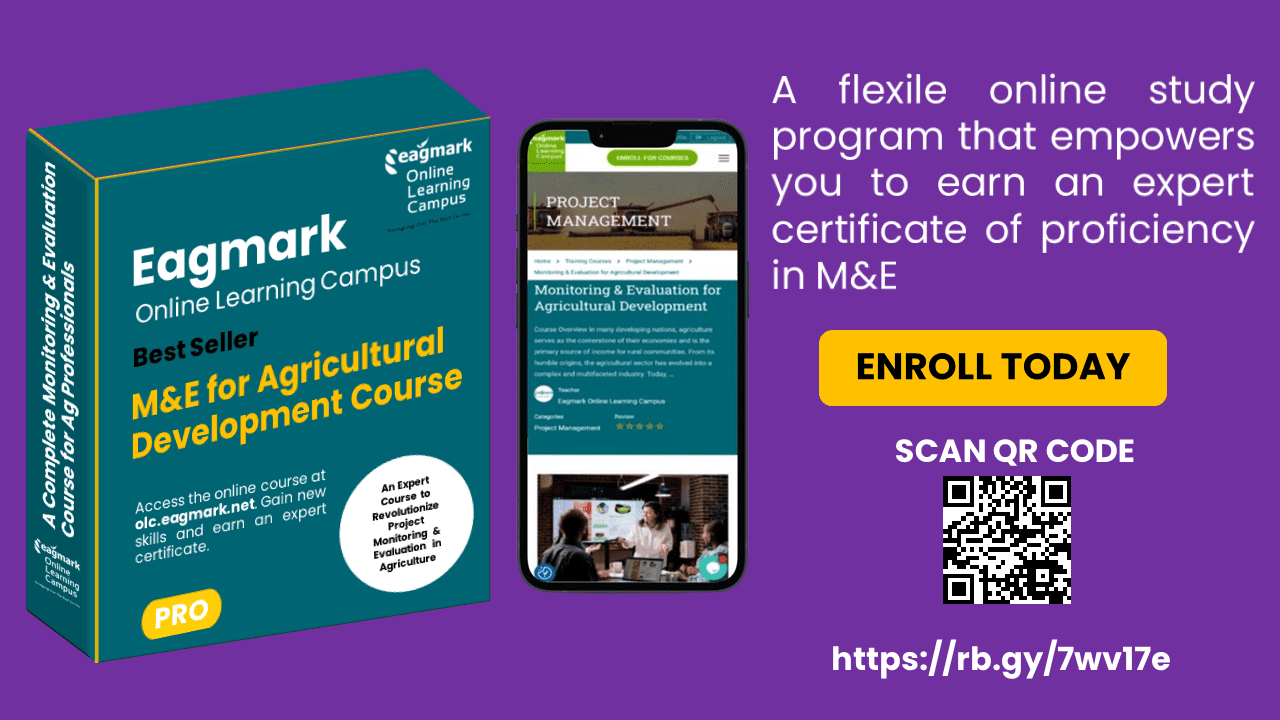
Download the Eagmark OLC Mobile APP
Course Overview
In many developing nations, agriculture serves as the cornerstone of their economies and is the primary source of income for rural communities. From its humble origins, the agricultural sector has evolved into a complex and multifaceted industry. Today, the challenge facing agriculture is twofold: ensuring equitable food distribution to the global population while safeguarding the environment from irreversible damage. Effective Monitoring and Evaluation (M&E) tools and techniques are crucial in ensuring that Agriculture Development (AD) projects are executed as intended, contributing to the eradication of hunger and poverty.
Course Objectives
This course aims to equip participants with the necessary skills to develop and manage robust M&E systems for the effective oversight of AD projects and programs. Participants will learn about M&E frameworks, indicators, tools, and techniques specifically tailored for AD.
Target Audience
This course is designed for researchers, project staff, development practitioners, managers, and decision-makers responsible for project, program, or organization-level M&E in Agriculture and Rural Development programs.
Duration
Duration: 4 Weeks
Upon completion of the course, participants will be able to:
- Understand the importance of M&E in AD programs.
- Utilize logical framework analysis to design AD projects.
- Define various AD indicators and track their performance throughout project lifecycles.
- Evaluate AD programs against set objectives and targets.
- Recognize the role of gender in M&E within AD programs.
- Conduct impact evaluations of AD programs.
Course Content Highlights 
-
Introduction to M&E:
- Definition and importance of M&E
- Key principles and concepts
- M&E throughout the project lifecycle
-
Agriculture and Rural Development Policy Issues:
- Sustainable agriculture and rural development
- Economic significance of agriculture
- Link between agriculture, rural development, and food security
-
M&E Frameworks in Agricultural Development:
- Conceptual and results frameworks
- Logical Framework Analysis (LFA)
-
Agricultural Development Indicators:
- Metric indicators and their linkage to results
- Sector-wide and specific indicators
- Indicators for thematic areas related to AD
-
M&E System and Planning in Agricultural Development:
- Importance of an M&E plan
- Components and documentation of an M&E plan
-
Data Management for M&E in Agricultural Development:
- Sources of data
- Surveys and participatory methods
- Data analysis techniques
-
Gender Integration in M&E for Agricultural Development:
- Integrating gender perspectives into project design
- Gender indicators and cross-cutting issues
-
Performance Evaluation of AD Programs:
- Components and designs of evaluations
- Evaluation processes and dissemination of findings
-
Impact Evaluations for AD and M&E Results Use and Dissemination
- Attribution and counterfactual estimation
- Impact evaluation methods
- Utilization of M&E results for project improvement
- Lessons learned, best practices, and reporting
Training Approach
Our experienced trainers, proficient in the field, have developed and delivered this course in English through a combination of theoretical discussions, practical activities, and case studies. The course has some M&E templates and additional study materials that course participants can utilize.
Tailor-Made Course
This course is tailored for agricultural professionals.
Certification
Upon completion of the course, participants will receive a certificate of proficiency in Monitoring and Evaluation for Agricultural Development.







